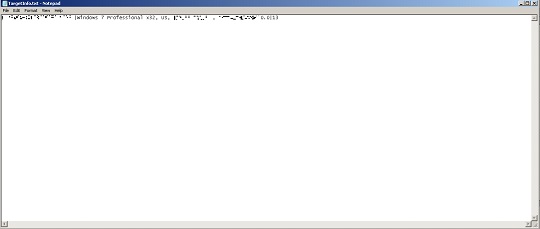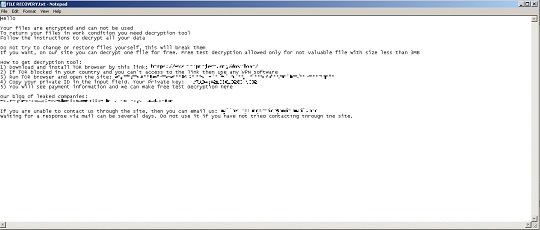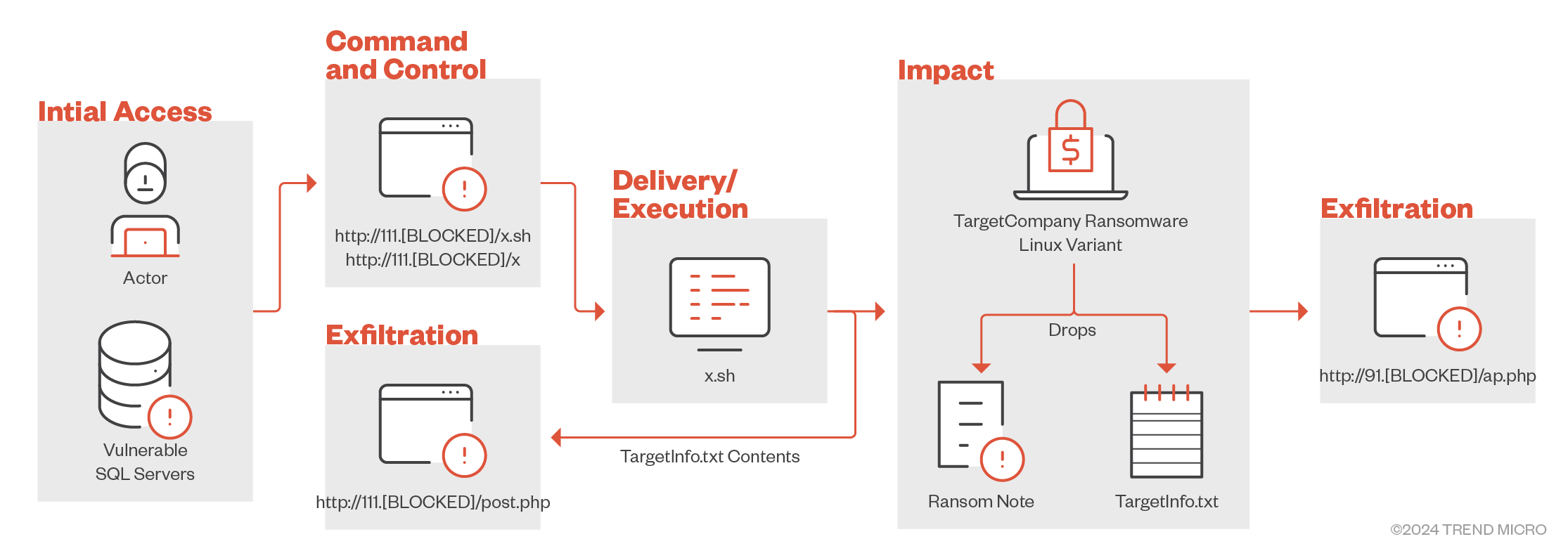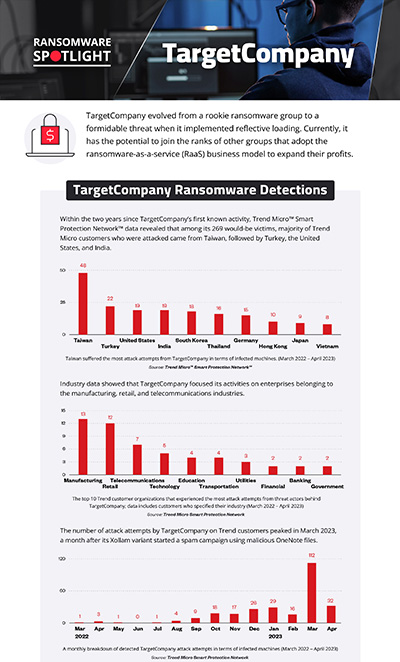Ransom.Win32.TARGETCOMP.SMYXCLAZ
Ransom.Mallox.S28994722 (QUICKHEAL), Ransom:Win32/GarrantDecrypt.PA!MTB (MICROSOFT)
Windows


Threat Type: Ransomware
Destructiveness: No
Encrypted: Yes
In the wild: Yes
OVERVIEW
This Ransomware arrives on a system as a file dropped by other malware or as a file downloaded unknowingly by users when visiting malicious sites.
It encrypts files with specific file extensions. It drops files as ransom note. It avoids encrypting files with the following file extensions.
TECHNICAL DETAILS
Arrival Details
This Ransomware arrives on a system as a file dropped by other malware or as a file downloaded unknowingly by users when visiting malicious sites.
Installation
This Ransomware adds the following processes:
- vssadmin.exe delete shadows /all /quiet
- cmd.exe /cbcedit /set {current} bootstatuspolicy ignorefailures
- cmd.exe /c bcedit /set {current} recoveryenabled no
- sc delete {name of service}
- taskkill -f -im {name of process}
Autostart Technique
This Ransomware starts the following services:
- mallox
Other System Modifications
This Ransomware modifies the following registry keys:
HKEY_LOCAL_MACHINE\SOFTWARE\Policies\
Microsoft\Windows NT\Terminal Services
MaxConnectionTime = 0 → no time limit for remote desktop connection
HKEY_LOCAL_MACHINE\SOFTWARE\Microsoft\
Windows\CurrentVersion\Policies\
System
shutdownwithoutlogon = 0 → prevents user from shutting down without logging on first
HKEY_LOCAL_MACHINE\SOFTWARE\Policies\
Microsoft\Windows NT\Terminal Services
MaxIdleTime = 0 → immediately disconnect after idling
HKEY_LOCAL_MACHINE\SOFTWARE\Policies\
Microsoft\Windows NT\Terminal Services
MaxDisconnectionTime = 0 → immediately log off after disconnection of remote desktop connection
HKEY_LOCAL_MACHINE\SOFTWARE\Microsoft\
PolicyManager\default\Start\
Hide
ShutDown = 0 → hides shut down option
HKEY_LOCAL_MACHINE\SOFTWARE\Microsoft\
PolicyManager\default\Start\
Hide
Restart = 0 → hides restart option
HKEY_LOCAL_MACHINE\SOFTWARE\Microsoft\
PolicyManager\default\Start\
Hide
SignOut = 0 → hides sign out option
It deletes the following registry keys:
HKEY_CURRENT_USER\SOFTWARE\Raccine → ransomware protection tool
HKEY_LOCAL_MACHINE\SOFTWARE\Raccine → ransomware protection tool
HKEY_LOCAL_MACHINE\SOFTWARE\Microsoft\
Windows NT\CurrentVersion\Image File Execution Options\
vssadmin.exe
HKEY_LOCAL_MACHINE\SOFTWARE\Microsoft\
Windows NT\CurrentVersion\Image File Execution Options\
wmic.exe
HKEY_LOCAL_MACHINE\SOFTWARE\Microsoft\
Windows NT\CurrentVersion\Image File Execution Options\
wbadmin.exe
HKEY_LOCAL_MACHINE\SOFTWARE\Microsoft\
Windows NT\CurrentVersion\Image File Execution Options\
bcdedit.exe
HKEY_LOCAL_MACHINE\SOFTWARE\Microsoft\
Windows NT\CurrentVersion\Image File Execution Options\
powershell.exe
HKEY_LOCAL_MACHINE\SOFTWARE\Microsoft\
Windows NT\CurrentVersion\Image File Execution Options\
diskshadow.exe
HKEY_LOCAL_MACHINE\SOFTWARE\Microsoft\
Windows NT\CurrentVersion\Image File Execution Options\
net.exe
HKEY_LOCAL_MACHINE\SOFTWARE\Microsoft\
Windows NT\CurrentVersion\Image File Execution Options\
taskkill.exe
Propagation
This Ransomware drops the following copy/copies of itself in remote admin shares:
- \224.0.0.22\admin$\mallox.exe
Process Termination
This Ransomware terminates the following services if found on the affected system:
- MSSQLFDLauncher
- MSSQLSERVER
- SQLSERVERAGENT
- SQLBrowser
- SQLTELEMETRY
- MsDtsServer130
- SSISTELEMETRY130
- SQLWriter
- MSSQL$VEEAMSQL2012
- SQLAgent$VEEAMSQL2012
- MSSQL
- SQLAgent
- MSSQLServerADHelper100
- MSSQLServerOLAPService
- MsDtsServer100
- ReportServer
- SQLTELEMETRY$HL
- TMBMServer
- MSSQL$PROGID
- MSSQL$WOLTERSKLUWER
- SQLAgent$PROGID
- SQLAgent$WOLTERSKLUWER
- MSSQLFDLauncher$OPTIMA
- MSSQL$OPTIMA
- SQLAgent$OPTIMA
- ReportServer$OPTIMA
- msftesql$SQLEXPRESS
- postgresql-x64-9.4
It terminates the following processes if found running in the affected system's memory:
- sqlbrowser.exe
- sqlwriter.exe
- sqlservr.exe
- msmdsrv.exe
- MsDtsSrvr.exe
- sqlceip.exe
- fdlauncher.exe
- Ssms.exe&&taskkill -f -imSQLAGENT.EXE
- fdhost.exe
- fdlauncher.exe
- sqlservr.exe
- ReportingServicesService.exe
- msftesql.exe
- pg_ctl.exe
- postgres.exe
Information Theft
This Ransomware gathers the following data:
- Hostname
- System Architecture
- Number of Processors
- Local IP Address
- System Locale
- OS Version
- System Volume Information
It stores collected data in the following file(s):
- {malware path}\TargetInfo.txt

Stolen Information
This Ransomware sends the gathered information via HTTP POST to the following URL:
- https://{BLOCKED}s.io/QWEwqdsvsf/ap.php
Other Details
This Ransomware connects to the following URL(s) to get the affected system's IP address:
- {BLOCKED}ify.org
It does the following:
- It only encrypts files with a files size that is greater than or equal to 10kB.
- It terrminates itself if the following countries were found in the affected system:
- Russian
- Kazakh
- Belarusian
- Ukrainian
- Tatar
- It blocks any system shutdown / reboot and displays the following message:
- Do NOT shutdown OR reboot your PC: this might damage your files permanently !
- It encrypts from local drives, removable drives, and network shares.
It accepts the following parameters:
- -l
- -d
- -p
- -path {path to encrypt}
Ransomware Routine
This Ransomware encrypts files with the following extensions:
- bak
- zip
- rar
- 7z
- gz
- sql
- mdf
- hdd
- vhd
- vdi
- vmx
- vmdk
- nvram
- vmem
- vmsn
- vmsd
- vmss
- lck
- vhdx
- vhd
- dbf
- ora
- oraenv
- dmp
- ibd
- mdb
- smd
- mdb
It avoids encrypting files with the following strings in their file name:
- desktop.ini
- ntuser.dat
- thumbs.db
- iconcache.db
- ntuser.ini
- ntldr
- bootfont.bin
- ntuser.dat.log
- bootsect.bak
- boot.ini
- autorun.inf
- debugLog.txt
- TargetInfo.txt
- mallox.exe
- FILE RECOVERY.txt
It avoids encrypting files with the following strings in their file path:
- msocache
- $windows.~ws
- system volume information
- intel
- appdata
- perflogs
- programdata
- application data
- tor browser
- boot
- $windows.~bt
- mozilla
- boot
- windows.old
- Windows Microsoft.NET
- WindowsPowerShell
- Windows NT
- Windows
- Common Files
- Microsoft Security Client
- Internet Explorer
- Reference
- Assemblies
- Windows Defender
- Microsoft ASP.NET
- Core Runtime
- Package
- Store
- Microsoft Help Viewer
- Microsoft MPI
- Windows Kits
- Microsoft.NET
- Windows Mail
- Microsoft Security Client
- Package Store
- Microsoft Analysis Services
- Windows Portable Devices
- Windows Photo Viewer
- Windows Sidebar
It appends the following extension to the file name of the encrypted files:
- {original filename}.{original extension}.mallox
It drops the following file(s) as ransom note:
- {all affected directories}\FILE RECOVERY.txt

It avoids encrypting files with the following file extensions:
- msstyles
- icl
- idx
- avast
- rtp
- mallox
- sys
- nomedia
- dll
- hta
- cur
- lock
- cpl
- Globeimposter-Alpha865qqz
- ics
- hlp
- com
- spl
- msi
- key
- mpa
- rom
- drv
- bat
- 386
- adv
- diangcab
- mod
- scr
- theme
- ocx
- prf
- cab
- diagcfg
- msu
- cmd
- ico
- msc
- ani
- icns
- diagpkg
- deskthemepack
- wpx
- msp
- bin
- themepack
- shs
- nls
- exe
- lnk
- ps1
- mallox
SOLUTION
Step 1
Trend Micro Predictive Machine Learning detects and blocks malware at the first sign of its existence, before it executes on your system. When enabled, your Trend Micro product detects this malware under the following machine learning name:
- TROJ.Win32.TRX.XXPE50FFF071
Step 2
Before doing any scans, Windows 7, Windows 8, Windows 8.1, and Windows 10 users must disable System Restore to allow full scanning of their computers.
Step 3
Note that not all files, folders, and registry keys and entries are installed on your computer during this malware's/spyware's/grayware's execution. This may be due to incomplete installation or other operating system conditions. If you do not find the same files/folders/registry information, please proceed to the next step.
Step 4
Disable this malware service
- mallox
Step 5
Restore this modified registry value
Important: Editing the Windows Registry incorrectly can lead to irreversible system malfunction. Please do this step only if you know how or you can ask assistance from your system administrator. Else, check this Microsoft article first before modifying your computer's registry.
- HKEY_LOCAL_MACHINE\SOFTWARE\Microsoft\Windows\CurrentVersion\Policies\System
- shutdownwithoutlogon = 0
- HKEY_LOCAL_MACHINE\SOFTWARE\Policies\Microsoft\Windows NT\Terminal Services
- MaxConnectionTime = 0
- HKEY_LOCAL_MACHINE\SOFTWARE\Policies\Microsoft\Windows NT\Terminal Services
- MaxDisconnectionTime = 0
- HKEY_LOCAL_MACHINE\SOFTWARE\Policies\Microsoft\Windows NT\Terminal Services
- MaxIdleTime = 0
- HKEY_LOCAL_MACHINE\SOFTWARE\Microsoft\PolicyManager\default\Start\Hide
- ShutDown = 0
- HKEY_LOCAL_MACHINE\SOFTWARE\Microsoft\PolicyManager\default\Start\Hide
- Restart = 0
- HKEY_LOCAL_MACHINE\SOFTWARE\Microsoft\PolicyManager\default\Start\Hide
- SignOut = 0
Step 6
Search and delete these files
- {all affected directories}\FILE RECOVERY.txt
- {malware path}\TargetInfo.txt
Step 7
Scan your computer with your Trend Micro product to delete files detected as Ransom.Win32.TARGETCOMP.SMYXCLAZ. If the detected files have already been cleaned, deleted, or quarantined by your Trend Micro product, no further step is required. You may opt to simply delete the quarantined files. Please check the following Trend Micro Support pages for more information:
Step 8
Restore encrypted files from backup.
Did this description help? Tell us how we did.





